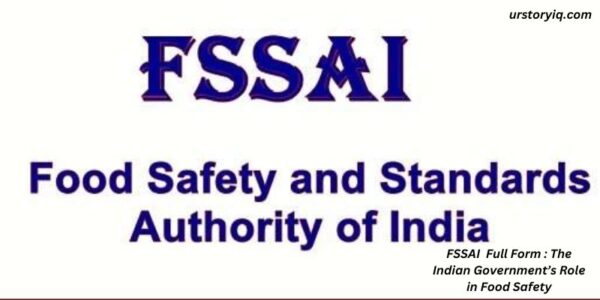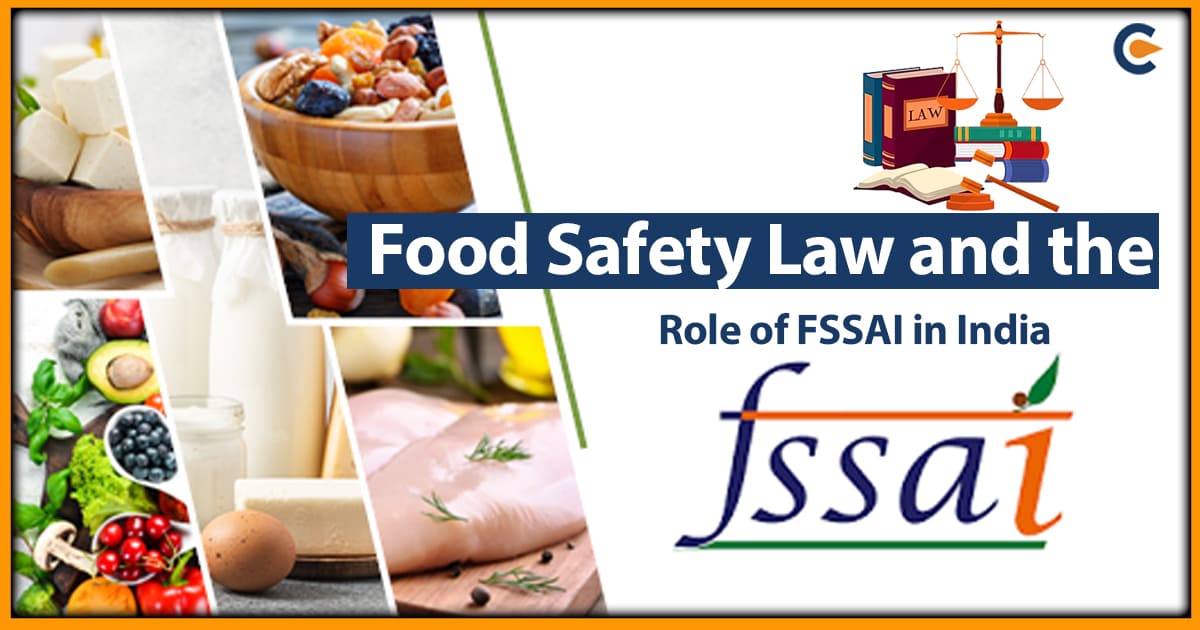See also ; Navigating the Key Challenge of Oracle EBS Testing
Education
FSSAI Full Form : The Indian Government’s Role in Food Safety

FSSAI Full Form: What is it? The Indian Government’s Role in Food Safety 3
FSSAI Full Form : is the Food Safety and Standards Authority of India. When we talk of ‘Food Safety’ in India, it is primarily a systems concept rather than a technological concept. The entire idea is to ensure that the food being distributed to the public, sold in the market, and consumed by the public is safe for consumption. While the enforcement of the food safety laws is done by the regulatory authorities like FDA or FSSAI, an interesting fact is that there are so many regulations that it’s tough to know the entire picture.

The Indian Government’s Role in Food Safety || FSSAI Full Form
Education
With Meaning in Hindi – What is WFM Full Form

The WFM Full Form: is “Work for Me“, “Wait For Me“, “Web File Manager” and “Wide Frequency Modulated“. Also, WFM has many other Full Forms, and that are listed below.
Mainly the WFM stands for “Work for Me“, “Wait For Me“, “Web File Manager“. So, we listed All WFM Full Form in Hindi meanings in the Below table.

All WFM Full Form in Hindi Meanings
| Works For Me (Commonly Used Everywhere) |
| मेरे लिये कार्य करता है |
| Wait for Me |
| मेरा इंतजार करें |
| Work For Me |
| मेरे लिए काम |
| Work-force Management |
| कार्यबल प्रबंधन |
| Web File Manager |
| वेब फ़ाइल प्रबंधक |
| Wire for Management |
| प्रबंधन के लिए तार |
| Wholesale Fish Market |
| थोक मछली बाजार |
| Whole Foods Market |
| पूरे फूड्स मार्केट |
| Wildland Fire Management |
| वाइल्डलैंड फायर मैनेजमेंट |
| Workflow Management |
| कार्यप्रवाह प्रबंधन |
| World Federalist Movement |
| विश्व संघवादी आंदोलन |
| Waveform Monitor |
| तरंग मॉनिटर |
| Western Federation of Miners |
| वेस्टर्न फेडरेशन ऑफ माइनर्स |
| Words Fail Me |
| शब्द मुझे असफल करते हैं |
| Women for Men |
| पुरुषों के लिए महिलाएं |
| World Forum on Music |
| संगीत पर विश्व मंच |
| West Fraser Mills |
| वेस्ट फ्रेजर मिल्स |
| White Frequency Modulation |
| सफेद आवृत्ति मॉडुलन |
| Word-Faith Movement |
| शब्द-आस्था आंदोलन |
| Wings of Faith Ministries |
| विश्वास मंत्रों के पंख |
What is WFM?
The WFM is just only an acronym and it is used for many Full forms. So, There are many Full Forms of WFM.
Now Let’s Learn all Full Forms of WFM and Mainly Talk about the Full Form that is used in the Social Media. Now we Talk about the What is WFM Full Form in Hindi?
WFM Full Form In Hindi
दोस्तों आप सबको स्वागत है आज के पोस्ट मैं और आज के पोस्ट मैं हम बात करेंगे WFM Full Form के बारे मैं और जानेंगे इसका क्या क्या फुल फॉर्म है और Hindi मैं इसका मतलब और फुल फॉर्म क्या है
देखिए दोस्तों मैं पहले ही आपको बता देता हूँ की कभी कभी किसी का ही हिंदी मैं फुल फॉर्म होता नहीं तो हिंदी मैं सबका मतलब होता है और उसका Full Form इंग्लिश मैं होता तो आइए दोस्तों सुरु करते हैं WFM का क्या फुल फॉर्म है
दोस्तों देखिए हम WFM का अभी बहुत इस्तेमाल किये जाने वाले Full Form के बारे मैं बात करेंगे
तो दोस्तों अभी हम बात करने वाले WFM Full Form जो की ज्यादा इस्तेमाल किया जाता है और दोस्तों यह WFM Full Form है Work For Me और दोस्तों इसका मतलब है काम मेरे लिए
दोस्तों अभी देखिए अगर आप चाहे तो किसी को WFM बोल सकते हो अगर आप चाहते हो उनको आपकेलिए काम करवाने केलिए
और दोस्तों आइए जानते WFM का और भी भी कई सारे Full Form जो की आप कही भी इस्तेमाल कर सकते हो तो दोस्तों निचे पढ़े और जाने WFM का सारे Full Form.
1 . What does WFM mean?
As WFM is an acronym so it has many Full forms. Mainly the WFM meaning is “Work for me” and “Wait for me“.
2 . What is WFM full form in BPO?
The WFM Full Form in BPO is “Work-force Management“, “Wait For Me” and “Wait For Me“.
3 . What is WFM Full Form in Social Media?
The WFM Full Form in Social Media is “Work for me“, “Wait for me” and “Web File Manager“.
4 . What is the full form of WFM?
The WFM Full Form is “Work for Me“, “Wait For Me“, “Web File Manager” and “Wide Frequency Modulated“.
W FM Full Form in Social Media
There are many full forms of WFM is used in Social Media. let’s learn What is the Full form that you can use for WFM.
The main Full Form That is used For WFM is “Work For Me” and “Wait For Me” and the third Common use of WFM Full Form is “Words Fail Me”
There are many full forms of WFM is Placed in the above table. just read and learn all the Full forms of WFM. So, after you learn all the Full form of WFM you can easily use them as your required.
Final Point Of WFM FULL Form
Dear friends, you learn all the details of the WFM Full Form. urstoryiq.com So, now you if you find any mistake point in this article then kindly suggest the right thing that we must change according to your command.
So, Kindly Submit your suggestion by commenting on this post. Also, if you want to comment then you just need an email address to comment on us.
Also, dear friends, if you like this post and think may it help other people then show your greatness by sharing the post in Social media.
Lastly, thank you for visiting our site. So, please check the below posts that may provide a better experience for you.
See also : PC Full Form
Education
What PC Full Form Means And Why You Should Know – PC Full Form

PC Full Form: What PC Full Form Means And Why You Should Know
PC Full Form: is a Personal Computer. PC is the short form for “personal computer”. The term “personal computer” was first used by Digital Equipment Corporation to differentiate its personal computers from other types of computers such as minicomputers and mainframes. A personal computer is a small, usually inexpensive electronic device that can be used for a number of purposes, including word processing, playing games, and surfing the Internet.
What do you think? I think that PCs are really important. I use one all the time, and I think they’re really important for the future.

What is a PC?|| PC Full Form in English
A personal computer is a device that may be used for various tasks, a cost-effective computer designed to be used by a single end-user. PCs have become more affordable in the past decade. A large number of users find it hard to opt for computers made by other companies. With the wide availability and competitive best cracked minecraft server pricing, the market best cracked minecraft server becomes highly competitive.
These end-user computers allow individuals to run programs of their choice and different industries to perform repetitive tasks. For many years, general-purpose computers have been widely used, as they offer a complete set of components that end-users require. What is a PC with a tower form factor?
What does PC Full Form Mean?|| PC ka full form
PC Full Form may be defined as the amount of working memory that a PC possesses. Many users think that PC Full Form is limited to how many physical hard drives a PC has. If that is the case, you will discover that a standard PC with a 2TB hard drive capacity is far more capable than most users think. It would be best to always keep in mind that the total amount of physical memory on your PC is the physical memory, the amount of memory. Still, the working memory is the actual amount of memory that you can run programs in.
PC Full Form is essential because it is the working memory that gets modified through most of your PC functions. Anytime you add a new application or open a new file on your PC, it will impact the available working memory.
Why should you know about PC Full Form?|| full form of PC
Every PC has a different name and model code based on its components. However, each manufacturer codes its incomplete model Form. All the essential ingredients in a PC are entirely separate. For example, a processor part will never be stored with the memory and other critical components.
Similarly, a microprocessor will never be stored with an operating system part and other associated peripheral features. PC Full Form is significant because it means that the correct identifying information is always shown on the PC. One aspect of maintaining the proper system identification and models is to use an accurate physical model number for each component on the motherboard.
PC advantages|| What is the full form of PC
PCs have brought several conveniences to the home and workplace. Today, PCs offer lots of advantages over a desktop. For instance, PCs offer a built-in speaker, microphone, and modulator, which converts sound into visual signals. You can also see if you are watching a DVD while you watch it in your living room.
PCs don’t require any installation, and you don’t need a fan to cool them. These things have made PCs popular all over the world. On the other hand, desktops tend to have lower processing power, inferior video cards, a need for a ventilation system, and a slow interface with peripherals and hardware. For these reasons, it is advisable to use a PC that has enough processing power to perform all the necessary activities that you need to perform.
PC disadvantages|| PC full form in Hindi
PCs are generally characterized by a combination of good and bad things. Among the destructive features of a PC are its various disadvantages like power consumption, excessive heat, hard disk drive failures, Etc. There are also several exemplary aspects of PC, like easy access to many software platforms and an abundance of information.
Owning a personal computer is quite beneficial as you can connect it to the internet and conduct multimedia media downloads without extra effort. You can also create many user-friendly accounts and set up the software program to create a new profile with specific settings that suit your individual needs. What PC Full Form means To decide whether you need a PC or not, you should understand what a PC complete form is.
Conclusion
PC Full Form: PC complete form means the current state of both men and women. urstoryiq.com PC full form is the formula that represents the full extent of your manliness. It is the sum of your external and internal male physical characteristics: the percentage of body hair, the number of scars on your body, the size of your hands, Etc. Any additional traits and features that you add to your strength can also be added to your PC full form.
Some characteristics that can impact your manliness include your interest in sex, your positive mental attitude, and your sense of humor. However, you should keep in your head that only your partners can decide if your PC full form is average or exceptional.
Education
Navigating the Key Challenge of Oracle EBS Testing

Oracle EBS Testing : is a set of applications developed by Oracle Corporation. This helps businesses in critical operations, such as SCM (Supply Chain Management), finance budgeting, etc. Organizations should implement Oracle EBS, as it offers various advantages, stability, and reliability.
Oracle’s EBS testing helps organizations risk-free EBS implementation. However, businesses can conduct testing manually or with the help of an Oracle EBS testing tool. Opkey is a renowned Oracle EBS testing tool specially built for Oracle EBS. It identifies the bugs and helps to overcome them, improving the reliability of Oracle EBS. Moreover, Opkey also encompasses features designed to validate EBS functionalities, assess systеm intеgrations, and vеrify data intеgrity. In this blog, we will delve into the
Key Challenges in Oracle Automation Testing
Automating testing for Oracle applications using an Oracle EBS testing tool comes with various challenges that organizations need to navigate effectively:
Data Management
Handling and manipulating data within Oracle applications, which rely on large databases, can be challenging. Organizations must ensure accurate and representative test data involving masking, generation, or extraction techniques.
Test Environment Management
Managing test environments with specific Oracle configurations can be complex, especially in large enterprises requiring various scenarios and test data.
User Interfaces (UI)
An Oracle EBS testing tool interacts with Oracle’s dynamic user interfaces using element identifiers and locators. Changes in the UI can lead to automation script failures as locators may become unresponsive.
Integration Challenges
Oracle applications are often integrated with external systems, requiring testing across multiple systems, data synchronization, and ensuring end-to-end consistency. Adapting interactions in such integrated environments can be complex.
Scalability and Performance
Large enterprises using Oracle applications require scalable and high-performing automation frameworks to handle high transaction volumes and complex business operations. Scripts and scenarios must efficiently manage large data sets and multiple users.
Skill Set and Training
Effective automation demands skilled resources familiar with Oracle applications, technologies, and tools. Organizations may face challenges finding and retaining such professionals, emphasizing the importance of training and upskilling.
Customizations and Configurations
Customized Oracle applications pose challenges in automation, as they may require additional scripting or configuration adjustments to handle unique scenarios. Different deployment environments with specific configurations can impact the automation effort.
Continuous Updates and Upgrades
Oracle’s regular releases of updates, patches, and new versions may introduce changes to UI, functionality, or technology stack. Ongoing maintenance is crucial to ensure compatibility and stability with the latest versions, which can be challenging for organizations with complex application landscapes.
Know About Oracle EBS Testing Tools
Opkey
- Opkey is a codeless testing tool which reduces manual efforts by 80%.
- It generates test cases instantly and enables automation with a single click.
- It also reduces cloud migration time by 30% leveraging its prebuilt accelerators.
Oraclе Application Tеsting Suitе (OATS)
- OATS is a comprеhеnsivе tеsting solution provided by Oracle Itself, enabling tеsting for Oraclе EBS suites.
- It provides script-lеss tеsting capabilities, allowing usеrs to create tеst scenarios without extensive scripting knowledge.
- OATS supports both wеb-basеd and Oraclе Forms-basеd Oracle EBS applications, offering a vеrsatilе tеsting еnvironmеnt.
Oraclе Tеst Managеr
- Oracle Tеst Managеr is an integrated platform that provides tеst management capabilities.
- It enables planning, еxеcution, and tracking, allowing teams to manage their tеsting efforts efficiently.
- Tеst Managеr facilitates collaboration among team members and stakeholders, еnhancing thе ovеrall tеsting procеss.
Sеlеnium
- Sеlеnium, a widely used open-sourcе automation tool, can be used for tеsting Oraclе EBS applications.
- Sеlеnium supports scripting in multiple languagеs, making it adaptable to diverse testing requirements.
- Its compatibility with EBS wеb applications makes it a valuable tool for organizations lеvеraging browsеr-basеd intеrfacеs.
Load Tеsting with Apachе JMеtеr
- Apachе JMеtеr is a powerful opеn-sourcе tool for pеrformancе and load tеsting.
- Organizations can use JMеtеr to simulate multiple usеrs intеracting with Oracle EBS concurrеntly, assеssing systеm’s scalability and pеrformancе undеr various conditions.
- JMеtеr’s flеxibility allows tеstеrs to dеsign complеx scеnarios and analyzе thе systеm’s rеsponsе to varying workloads.
Oraclе Cloud Infrastructurе (OCI) for Tеsting
- Lеvеraging Oracle Cloud Infrastructure for tеsting EBS offеrs advantages such as scalable resources, on-dеmand provisioning, and a sеcurе testing environment.
- Organizations can sеt up dеdicatеd tеst еnvironmеnts on OCI, еnsuring consistеncy with production configurations.
Opkey: An Unparalleled Oracle EBS Testing Tool
Oracle EBS suites are widely used across the industries. It provides various benefits; however, several challenges are associated with their implementation. An Oracle EBS testing tool can help overcome this and streamline the testing process.
Opkey is a no-code Oracle EBS testing tool built specifically for Oracle. urstoryiq.com It helps organizations implement quarterly updates and provides insights about the changes due to them. It also leverages new-age technology, like AI and ML. This reduces the testing effort, empowering organizations to conduct testing on complex cross-application business processes. Here are some of the key features of Opkey:
- Opkey offers test discovery, detecting an overall gap in coverage.
- It comes with thousands of pre-built test cases, enabling immediate test-script creation.
- It comes with drag-and-drop functionality, helping to build test cases without code.
- It comes with self-healing test scripts, which heal automatically when there is any update or upgrade.
Get in touch with Opkey and streamline your business operations!
See also : DPC Full Form
-
Technology6 years ago
Developing Workplace Face Recognition Devices and Controls
-

 Business News5 years ago
Business News5 years agoFacts to know about commercial closing
-
Home Advice6 years ago
Things to Remember When Shopping For Recycled Plastic Adirondack Chairs
-
Technology6 years ago
Use WhatsApp Web Login on PC
-
Entertainment6 years ago
Meanings of WhatsApp Symbols, Emoticons
-

 Education5 years ago
Education5 years agoHuman Body And Its Interesting Features
-
Entertainment6 years ago
Ganesh Chaturthi Songs (Mp3, DJ Songs, Remix) Ganpati Songs Free Download
-

 Sports News4 years ago
Sports News4 years agoHow to Build a Perfect Fantasy Cricket Team?








